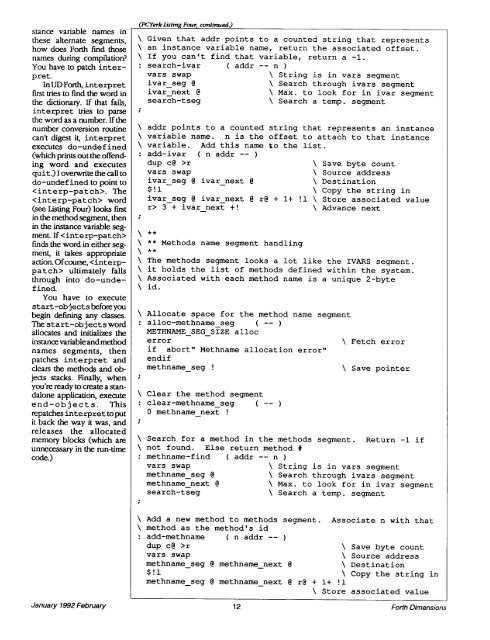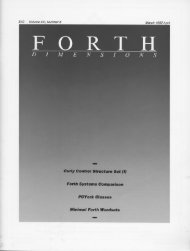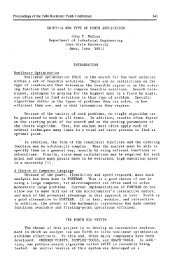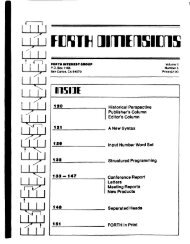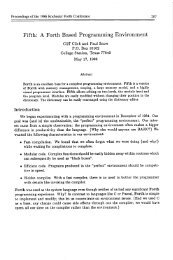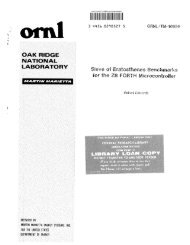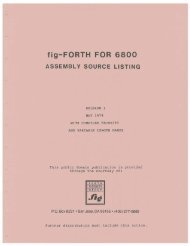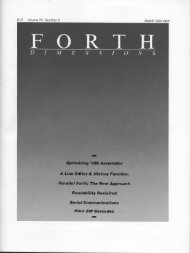5 - Forth Interest Group
5 - Forth Interest Group
5 - Forth Interest Group
Create successful ePaper yourself
Turn your PDF publications into a flip-book with our unique Google optimized e-Paper software.
stance variable names in<br />
these alternate segments,<br />
how does <strong>Forth</strong> find those<br />
names during compilation?<br />
You have to patch inter-<br />
pret.<br />
InUD <strong>Forth</strong>, interpret<br />
first tries to find the word in<br />
the dictionary. If that fails,<br />
interpret tries to parse<br />
the word as a number. If the<br />
number conversion routine<br />
can't digest it, interpret<br />
executes do-undef ined<br />
(which prints out the offend-<br />
ing word and executes<br />
quit.) I overwrite the call to<br />
do-undef ined to point to<br />
. The<br />
word<br />
(see Listing Four) looks fmt<br />
in the method segment, then<br />
in the instance variable seg-<br />
ment If <br />
finds the word in either seg-<br />
ment, it takes appropriate<br />
adion. Ofcourse, ultimately falls<br />
through into do-unde-<br />
fined<br />
You have to execute<br />
start-ob jects befoe you<br />
begin defining any classes.<br />
The start-ob jectsword<br />
allocates and initializes the<br />
instance variable and method<br />
names segments, then<br />
patches interpret and<br />
clears the methods and ob-<br />
jects stacks. Finally, when<br />
you're ready to create a stan-<br />
dalone application, execute<br />
end-ob jects. This<br />
repatches interpret to put<br />
it back the way it was, and<br />
releases the allocated<br />
memory blocks (which ae<br />
unnecessary in the run-time<br />
code.)<br />
(PCYerk Listing Four, continued.)<br />
\ Given that addr points to a counted string that represents<br />
\ an instance variable name, return the associated offset.<br />
\ If you can't find that variable, return a -1.<br />
: search-ivar ( addr -- n )<br />
vars swap \ String is in vars segment<br />
ivar-seg @ \ Search through ivars segment<br />
ivar-next @ \ Max. to look for in ivar segment<br />
search-tseg \ Search a temp. segment<br />
I<br />
\ addr points to a counted string that represents an instance<br />
\ variable name. n is the offset to attach to that instance<br />
\ variable. Add this name to the list.<br />
: add-ivar ( n addr -- )<br />
dup c@ >r \ Save byte count<br />
vars swap \ Source address<br />
ivar-seg @ ivar-next @ \ Destination<br />
$!l \ Copy the string in<br />
ivar-seg @ ivar-next @ r@ + 1+ !1 \ Store associated value<br />
r> 3 + ivar-next +! \ Advance next<br />
\ **<br />
\ ** Methods name segment handling<br />
\ **<br />
\ The methods segment looks a lot like the IVARS segment.<br />
\ it holds the list of methods defined within the svstem.<br />
\ Associated with each method name is a unique 2-byte<br />
\ id.<br />
\ Allocate space for the method name segment<br />
: alloc-methname-seg ( -- )<br />
METHNAME - SEG-SIZE alloc<br />
error \ Fetch error<br />
if abort" Methname allocation error"<br />
endif<br />
methname-seg ! \ Save pointer<br />
\ Clear the method segment<br />
: clear-methname-seg ( -- )<br />
0 methname-next !<br />
\ Search for a method in the methods segment. Return -1 if<br />
\ not found. Else return method #<br />
: methname-find ( addr -- n )<br />
vars swap \ String is in vars segment<br />
methname-seg @ \ Search through ivars segment<br />
methname-next @ \ Max. to look for in ivar segment<br />
search-tseg \ Search a temp. segment<br />
I<br />
\ Add a new method to methods segment. Associate n with that<br />
\ method as the method's id<br />
: add-methname ( n addr -- )<br />
dup c@ >r \ Save byte count<br />
vars swap \ Source address<br />
methname-seg @ methname-next @ \ Destination<br />
$!l \ Copy the string in<br />
methname-seg @ methname-next @ r@ + 1+ !1<br />
\ Store associated value<br />
January 1992 February 12 <strong>Forth</strong> Dimensions<br />
..<br />
I


